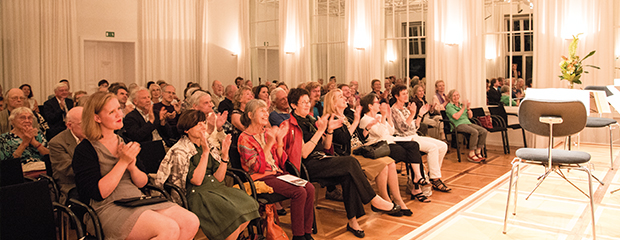
Events
One of the central tasks of the Staatsinstitut is to organise public events. These include concerts, lectures, panel discussions, readings, film screenings, symposia and exhibitions. For this purpose, the Orff Centre Munich has its own hall with 99 seats, a Bechstein grand piano (a gift from Liselotte Orff) and, since 1992, a modern sound and lighting system, which was renewed in 2012/13 and adapted to current technical requirements. Between 9 and a maximum of 15 events take place each year.
The programme focuses on the entire oeuvre of Carl Orff. The works are performed either in their original form or - more rarely - in approved arrangements. Film screenings make it possible to visualise large-scale stage works or to present historical film documents, portraits, etc. The Institute also occasionally uses other venues. Occasionally, the Institute also uses other halls or rooms as venues.
In addition, the planning of events is oriented towards Orff's own interests, which, thanks to the broad intellectual horizon of the composer and theatre man, offer a wealth of the most diverse points of contact. This results in many revealing connections and illuminating references between the supposedly remote and Orff's work. Orff's interests include the compositions of the "classics" of the 20th century (Stravinsky, Bartók, etc.) as well as the latest music (hence pieces by young composers and numerous world premieres), early music (Monteverdi, Orlando di Lasso, etc.), non-European music (from Africa, Asia, etc.), and all conceivable combinations of music, language, movement, theatre, literature and the visual arts. Events that have neither a direct nor an indirect reference to Carl Orff mostly result from cooperation with other cultural institutions (see Chapter 9: Cooperations).
While concerts, readings, film screenings and exhibitions primarily reflect Orff's work or interests directly, symposia, lectures and panel discussions focus on scholarly research into the composer's life and work. The Orff Centre Munich has always attached importance to the fact that these academic events are also fully accessible to anyone interested.
All of the centre's own events and almost all of its cooperative events open not only with a welcome, but also with a more in-depth introduction to the subject matter and a pointing out of the connections to Orff's oeuvre by the director of the State Institute. Likewise, the short texts of the invitation cards, which are sent to about 5,000 cultural workers and culturally interested people in Germany and abroad, regularly inform those who cannot come to the events at the Orff Centre Munich.

